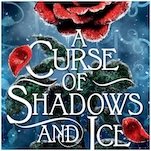Today, Québec duo Ghostly Kisses—the project of musicians Margaux Sauvé and Louis-Étienne Santais—released their sophomore album, Darkroom. The LP is understated and picturesque, with Sauvé’s hushed vocals colliding with Santais’ technicolor arrangements. The result is a collection of muted, sublime club tracks best-suited to be listened to alone. It’s that duality that makes songs like “On & Off,” “Crimson” and “Keep It Real” shine, as flourishes of electronica set aglow beneath Sauvé’s voice. There is a gentle composure running throughout the record, a profound intensity that never ruptures. An emotional anchor arises from Sauvé and Santais’ chemistry, allowing Darkroom to exist as an epic portrayal of post-modern pain told through the voice of lurid synths and a crushing, hypnotic lilt.
“There’s No More Space”
Margaux: I noticed that feelings of depression and boredom were recurring themes in the testimonies shared on the Box of Secrets. “There’s No More Space” centers around the longing for a lost relationship. I wanted the lyrics to convey a sense of tedium and monotony in wakefulness, with a contrast to the yearning to retreat into dreams.
Louis: For “There’s No More Space,” the ideation and production process happened very quickly, probably 85% over the course of one day. The flow was very natural and involved little second-guessing. The whole idea emerged from childhood memories of how a portion of pop music sounded at the end of the 90’s and early 2000’s. Strings, Gregorian choirs, laid-back beats (loosely à la J Dilla), syncopated bass grooves, luminous orchestral instruments and samples constitute the bulk of the music supporting Margaux’s delicate vocals. The music is set to complement the vocal melody and the lyrics as much as possible, with many tiny elements (or silence) to amplify what Margaux is saying. For instance, the ghost-like repeating vocals in between phrases in the verse are meant as an expression of dullness of repeating days, etc.
“Keep It Real”
Louis: Tenebrous synths mark the entrance of the song, which then evolves into a full-blown groovy backbeat. We wanted to create as many melodic hooks as possible, while keeping the harmonic direction voluntarily changing to put emphasis on the story behind the song.
Margaux: One could almost see it as a dialog between a strong character that drives everything forward, demanding clarity (vocals, drums) and this troubled, doubled-faced, and ever-changing character that can act deceitfully (synths, bends, samples, etc.).
“Golden Eyes”
Margaux: I share my experience of falling in love with my best friend and the awkwardness I felt when I finally confessed my feelings to him. These lyrics were inspired by the stories shared on the Box of Secrets, highlighting the difficulty and overwhelming nature of expressing our deepest emotions to someone we truly care about. The verses feel intimate, almost as if I’m revealing a secret, while the music in the choruses lifts the song with its bright and catchy melodies.
Louis: George Fitzgerald and I had a wonderful time playing with sounds that took their roots from the 90-00’s dance/garage scene and 90’s new age (Enigma), while trying to remain faithful to Ghostly Kisses’ more modern sound. Time will tell if people adopt it, but we’re very proud of that record.
“Lonesome Hero”
Margaux: I was marked by a striking message on the Box of Secrets about someone’s previous struggle with anorexia and the profound sense of isolation the person endured. It painted a picture of a world that seemed incompatible with her existence, where each day presented itself as a relentless battle.
Louis: Oli Bayston really helped to bring this sense of contrast forward, with the addition of a plethora of super soulful synths, a pounding drum groove and a bass that gives a kind of “push and pull” feeling.
“Ocean”
Margaux: For the lyrics of “Ocean,” I wanted to instill a sense of inner strength and power in listeners. It underscores the idea that, despite the fears associated with independence, everyone possesses a formidable inner strength.
Louis: “Ocean” is a happy and celebratory song in Ghostly Kisses’ world. It’s mixolydian harmony was chosen on purpose for its kind of “liberative” flavor, a bit like you would experience when listening to Lorde’s “Royals” or” Greenlight” or “Shake it Off” by Taylor Swift. This is reinforced by the “UK Garage” type of feeling present in the first half of the song, and then by the four-to-the-floor drum transition, supplemented by the “Cher” and “Venga Boys” types of bass and synths bouncing around it. Oli Bayston really helped to bring out more colors in this one, especially in the groove and synths-heavy parts of the song. The exploration of different vocal textures is helpful in the progression of the story of the song, which is centered around the “liberation” of the protagonist from a toxic and overly dramatic friendship.
“Calm Down”
Margaux: In “Calm Down,” I delve into the struggles of living with anxiety, depression, coping with the distance from a loved one, and wrestling with the complexities of ambiguous relationships, all of which have been prevalent topics within the Box of Secrets community. The repetition of “Calm down, calm down” mirrors the internal dialogue one might face when dealing with anxiety.
Louis: In terms of production, Calm Down was one of the toughest nuts to crack during the process of the album. We had to complete like 27 different iterations of the instrumental with different co-producers to end up with this version of the song. Oli Bayston really went out of his way to reharmonize and rebuild the entire synths arsenal around our vocal melodies and harmonies. I was so sure of this song’s potential that I would never quit trying to get it to a “radio-friendly” space musically speaking. When Oli sent us this version, I was appeased and quite satisfied with it
“On & Off”
Margaux: In “On & Off,” I explore the intricacies of a relationship between two individuals who share a deep bond, who connect on a level that goes beyond words, understanding each other effortlessly. Despite the undeniable bond they share, they often find themselves in conflict, pushing each other away only to gravitate back together once more.
These lyrics are inspired by the stories shared within the Box of Secrets, reflecting the common pattern seen in turbulent relationships. Drawing from various narratives, it’s clear that themes of love, loss, and the struggle to maintain connections with people from the past resonate universally.
Louis: For “On & Off,” Oli and I aimed to keep it as straightforward and digestible as possible. As always, the primary focus is on the melody and vocals, while leaving space for certain production elements to shine at times. It’s a playful exploration into the synth-pop/indie-pop realm, inspired by the idea of how a band would optimize the composition for a live performance. We intentionally preserved room for human imperfections, enabling live recordings of various instruments to be edited with less quantization or temporal rigidity. Oli added a lot to this track, incorporating very cool parts and synth sounds to the whole production, which makes everything much more interesting in my opinion.
“Silver Screen”
Margaux: I imagined “Silver Screen” as if it were plucked straight from a movie scene, or at least that’s how Louis-Étienne and I envisioned it. This song perfectly encapsulates that delicate moment of awakening, where our eyes flutter open, caught between the realms of sleep and wakefulness. In that quiet, introspective moment, we can’t help but wonder if we’re still lost in a dream or if reality has gently reclaimed us. To convey the vulnerability of this particular moment, we opted to record the vocals in a single, uninterrupted take, seeking to preserve the authenticity and rawness of the experience.
Louis: “Silver Screen” was born out of a fascination with vintage ballads and jazz sad standards. The pure melancholy of, among others, classical songs like “Almost Blue” by Chet Baker or “Gloomy Sunday” (Rezső Seress), was something we were always intrigued in trying to conjure in a Ghostly Kisses’ composition. This melody had been resting for years in my “voice notes” folder, so, when we found it, we instantly knew we had to bring it to life. Oli helped us to take it in a bit of a trip-hop direction, all the while keeping the simplicity of the original arrangement intact.
“Crimson”
Margaux: Its origins stem from the countless messages I’ve received on the Box of Secrets, where individuals confess the challenges of navigating their homosexuality and the barriers they face in expressing or living their love openly, constrained by familial or societal pressures. Moreover, the song delves into the Iranian protest movement, sparked by the tragic death of Mahsa Amini, advocating for women’s freedom.
“I know it’s not us, I know it’s not us, I know it’s not us to flee and hush / I know it’s not us, I know it’s not us, they bruise they crush, they kill the love instead”
This passage vividly captures the intensity of their emotions—the profound anger, the deep-seated pain, and an unwavering resolve to persist in the fight for their rights and freedoms. Through “Crimson,” we are offered a powerful medium to amplify the voices of those who are silenced.
Louis: The most lyrically intense song of the album, like one could almost assume it would be, is completed with the most intense musical production on there as well. Many choices are very intentional throughout the song:
– The song starts with an intense chorus that focuses the attention on “If I could only find a way out” almost instantly.
– The almost organ-like prophet is repeating very simple intense chords so that the emphasis is on the emotion transmitted by the voice.
– Verses are sung by one voice. Then, the message comes “I know it’s us”, progressively joined by more and more voices as a metaphor of how a movement starts. Very stripped back arrangements when those voices come on.
– Heavily distorted cello solo as a musical suggestion that truth and pure human emotions often manage to find their way out of brutal environments, although sometimes reaching the surface damaged.
“Within”
Margaux: I dive into the theme of choices in “Within.” Specifically, I explore the multitude of decisions that emerge as we transition into young adulthood. I emphasize the profound impact these choices have on shaping the course of our life’s journey. Within posed a unique challenge during the lyric-writing process, given its inherent lack of a definitive answer. I’m not sure if the listeners expect us to give definite answers in our songs… but I prefer to perceive my role as that of a questioner too. The one thing I’ve come to believe is that the answer to any choice lies within the person making it.
Louis: “Within,” for me, is a quite quirky-sounding and magical song. The lyrics subtly incorporate a kind of imagery that relates to some of Lewis Carroll’s worlds. The music is, at least in part, abstractly reflective of this imagery. Vocoders, shimmering icy synths, weird bending elements, music boxes, and very pointy drum sounds are all elements that immerse you in that otherworldly atmosphere. We didn’t even speak about it, but, interestingly, all the sounds that Oli Bayston designed fit right in that spectrum.
“Beneath The Clouds”
Margaux: “Beneath The Clouds” was one of the first compositions for the album. It tells the story of a friend of mine who’s wrestling with depression and isolation, finding it hard to open up or express their true emotions, which makes it difficult to grasp their inner turmoil. Additionally, the song acts as a conduit through which I extend a hand to those suffering in silence, encouraging them to open and remember that they are surrounded by people who care for them deeply.
Louis: “Beneath The Clouds” started off from the vague idea that we wanted to have a song based on strings, drums, syncopated bass, and vocals only. The higher tempo is meant for people to experience it physically when we’ll play it live and be able to groove or dance to it. A high energy song with an emotional charge or a “cry on the dancefloor” is what we tried to create.
“Carousel”
Louis: The lyrics meticulously depict the intricate details experienced during a carousel ride, where one’s attention desperately attempts to seize every fleeting moment, persuading itself to divert focus, to convince that the absence of the other person is no longer essential. When listening to the song, the aim is to truly experience the sensation of the wind, while your heart feels tight, and the same unanswered questions continue to swirl in your mind.
Margaux: Reading the Box of Secrets, someone made a reference about doing carousel rides over and over and I thought the image was so strong and I related so much to it. When I’m feeling down, my usual recourse is to take a walk or go for a bike ride in parks or in nature to feel the wind on my face. It makes me feel alive somehow.
















































































